Select Language
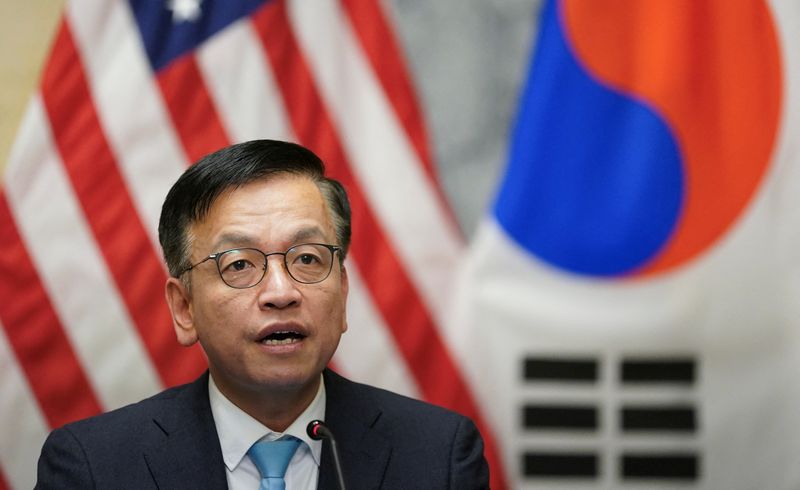
By Jihoon Lee
SEOUL (Reuters) - South Korea's acting President Choi Sang-mok on Wednesday said he hoped for a swift agreement within the country's parliament on an extra budget to support an economy struggling with slowing domestic demand and heightened external uncertainty.
"I hope that parliament reaches an agreement on the basic principles regarding the supplementary budget as soon as possible," said Choi, the country's finance minister who is serving as acting president.
On Tuesday, the floor leader of the ruling People Power Party, Kweon Seong-dong, said that the party was not opposed to discussing an extra budget. His comment came a day after the leader of the opposition Democratic Party proposed an extra budget of at least 30 trillion won ($20.65 billion).
Asia's fourth-largest economy barely grew in the fourth quarter of 2024, as the country's worst political crisis in decades hurt already weakened domestic demand and threatened to further sap growth in a year of rising external risks under the second Donald Trump presidency.
There have been growing calls among economists and even from the central bank governor that the government draft a supplementary budget to support the economy. South Korea's economic growth is expected to slow to 1.6% or 1.7% this year, from 2.0% last year, according to the Bank of Korea.
Choi also said the government would respond preemptively to any domestic impact from U.S. tariffs by preparing support measures for domestic firms and seeking to diversify export markets.
The government will strengthen support for the biopharmaceutical sector and assist domestic firms to connect with manufacturing facilities in the United States, Choi said, after U.S. President Trump said the sector was also under consideration for tariffs.
($1 = 1,452.5800 won)
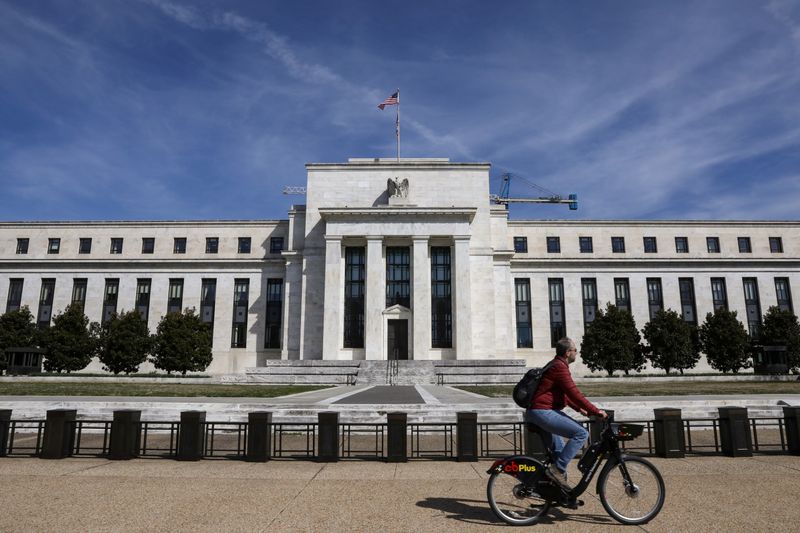
(Reuters) -U.S. central bankers paused interest-rate cuts at their January 28-29 meeting, noting bumpy progress toward their 2% inflation goal, a still-strong labor market, and a lot of uncertainty over tariffs, tax cuts, and other economic policies under President Donald Trump.
Here is a look at their comments since then, sorting them under the labels "dove" and "hawk" as shorthand for their monetary policy leanings. A dove is more focused on risks to the labor market and may want to cut rates more quickly, while a hawk is more focused on the threat of inflation and may be more cautious about rate cuts.
The designations are based on comments and published remarks; for more, click on the photos in this graphic. For a breakdown of how Reuters' counts in each category have changed, please scroll to the bottom of this story.
Dove Dovish Centrist Hawkish Hawk
Christopher Jerome Powell, Michelle Bowman,
Waller, Governor, Fed Chair, Governor,
permanent voter: permanent permanent voter:
No public voter: "We do "I continue to
comments on not need to be see upside risks
monetary policy in a hurry to to inflation….I
since Jan 2025. adjust our continue to
policy stance." prefer a cautious
Feb 11, 2025 and gradual
approach to
adjusting
policy.” Jan 31,
2025
Lisa Cook, John Williams,
Governor, New York Fed Jeffrey Schmid,
permanent voter: President, Kansas City Fed
No public permanent President, 2025
comments on voter: No voter: No public
monetary policy public comments comments on
since Jan 2025. on monetary monetary policy
policy since since
Jan 2025. Jan
2025.
Austan Goolsbee, Philip Alberto Musalem,
Chicago Fed Jefferson, Vice St. Louis Fed
President, 2025 Chair, President, 2025
voter: "I think permanent voter: No public
we're on path voter: “We can comments on
back to 2% on the be patient and monetary policy
inflation wait to see the since Jan 2025.
side…And as that net effect of
inflation comes any policy
down, we can changes by the
commensurately be current
cutting the administration.
interest rate." ” Feb 5, 2025
Feb 7, 2025
Michael Barr, Beth Hammack,
Vice Chair of Cleveland Fed
Supervision, President, 2026
permanent voter: "Given
voter: No current economic
public comments conditions, it
on monetary will likely be
policy since appropriate to
May 2024. hold the funds
rate steady for
some time.” Feb
11, 2025
Adriana Kugler, Lorie Logan,
Governor, Dallas Fed
permanent President, 2026
voter: “The voter: “If
prudent step is inflation comes
to hold the in close to 2% in
federal funds coming months…it
rate where it wouldn’t
is for some necessarily allow
time." Feb 7, the FOMC to cut
2025 rates soon.” Feb
6, 2025
Susan Collins, Neel Kashkari,
Boston Fed Minneapolis Fed
President, 2025 President, 2026
voter: "It's voter: "We're in
really a very good place
appropriate for to just sit here
policy to be until we get a
patient, lot more
careful, and information on
there's no the tariff front,
urgency for on the
making immigration
additional front, on the tax
adjustments." front, etc.” Feb
Feb 3, 2025 7, 2025
Patrick Harker, Thomas Barkin,
Philadelphia Richmond Fed
Fed President, President, 2027
2026 voter: No voter: "I start
public comments with a baseline
on monetary that is pretty
policy since favorable (to
Jan 2025. further
interest-rate
cuts)....That is
certainly the
lean." Feb 5,
2025
Raphael Bostic,
Atlanta Fed
President, 2027
voter: ”There
are a lot of
things I am
going to wait
and see about
... I'd be very
satisfied to
wait for a
while.” Feb 3,
2025
Mary Daly, San
Francisco Fed
President, 2027
voter:
“Uncertainty is
not paralysis.
It just means
you have to
watch and be
careful and
thoughtful as
you navigate
the information
we have.” Feb
4, 2025
Notes: The current policy rate target range is 4.25%-4.50%. As of December, Fed policymakers projected half of a percentage point of rate cuts this year, less than in 2024; they next publish projections at their March 18-19 meeting.
The seven Fed governors, including the Fed chief and vice chairs, have permanent votes at the Federal Open Market Committee meetings, which are held eight times a year. All 12 regional Fed presidents discuss and debate monetary policy at the meetings, but only five cast votes, including the New York Fed president and four others who vote for one year at a time on a rotating schedule.
Reuters over time has shifted policymaker designations based on fresh comments and developing circumstances. Below is a Reuters count of policymakers in each category, heading into recent Fed meetings.
FOMC Date Dove Dovish Centrist Hawkish Hawk
Jan. '25 0 3 9 7 0
Dec. '24 0 2 10 7 0
Nov. '24 0 0 13 5 0
Sept '24 0 1 12 5 0
May through July '24 0 1 10 6 1
March '24 0 1 11 5 1
Jan '24 0 2 9 4 1
Dec '23 0 2 9 4 1
Oct/Nov '23 0 2 7 5 2
Sept '23 0 4 3 6 3
June '23 0 3 3 8 3
March '23 0 2 3 10 2
Dec '22 0 4 1 12 2
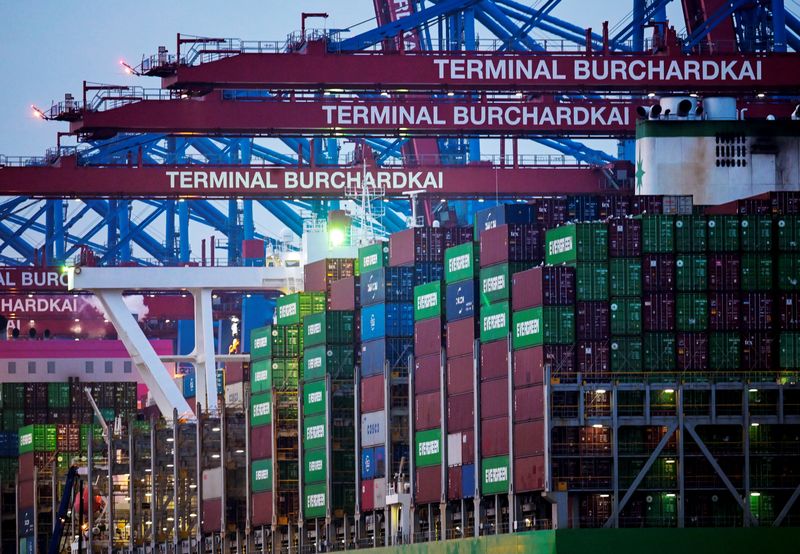
By Maria Martinez and Rene Wagner
BERLIN (Reuters) -Germany's trade surplus with the United States reached a record level last year, data from the statistics office showed, as countries wait to learn how U.S. President Donald Trump will impose tariffs on imported goods.
Germany's trade surplus with the U.S. expanded to 70 billion euros ($72 billion) in 2024, well above the previous record of 63.3 billion euros reported for the full year 2023.
"It would be hard to imagine worse timing," said Holger Goerg, from the Kiel Institute for the World Economy (IfW).
Trump substantially raised tariffs on steel and aluminum imports on Monday to 25% "without exceptions or exemptions". The White House on Tuesday declined to comment on the German trade surplus.
German Chancellor Olaf Scholz said the European Union was still awaiting formal notice of any new tariffs but that any such move would be met with retaliatory measures.
The increase in trade surpluses could reverse, Goerg said, if Trump imposed new tariffs on German imports, a measure the U.S. president says would boost U.S. manufacturing.
Damon V. Pike, a trade specialist and principal with the U.S. division of global accounting firm BDO International, said Trump had long been frustrated by Germany's longstanding reliance on exports and failure to pump up domestic demand.
“He’s talked about that, how he’s sick of these persistent trade deficits with the European Union,” he said, noting that Trump had already flagged plans to put tariffs on EU imports as early as next week.

Investing.com-- Gold prices rose to fresh record highs in Asian trade on Tuesday as persistent concerns over increased trade tariffs under U.S. President Donald Trump fueled safe haven demand.
The yellow metal vastly outpaced other metals, shrugging off strength in the dollar after Trump signed orders imposing 25% tariffs on all steel and aluminum imports to the U.S.
Trump also raised the prospect of more trade duties this week.
Increased geopolitical jitters also fueled gold demand, after Trump demanded Hamas return all Israeli hostages by this weekend, warning of dire consequences.
Spot gold hit a record high of $2,942.69 an ounce, while gold futures jumped to a peak of $2,968.39 an ounce, before trading slightly below the highs by 00:42 ET (05:42 GMT).
Gold rallies as Trump imposes 25% steel and aluminum tariffs
Trump on Monday signed an executive order imposing 25% tariffs on all steel and aluminum imports, the latest in his line of trade tariffs. The new tariffs will become effective by March 12.
The U.S. President said he could raise tariffs on the commodities further, and also said he will reveal plans for reciprocal tariffs against major U.S. trading partners this week.
This comes just a week after Trump slapped China with 10% tariffs, drawing ire and retaliation from Beijing.
Markets feared that more tariffs from Trump will escalate an already brewing trade war between the world’s biggest economies, sparking disruptions in global trade and denting economic activity. This notion pushed traders squarely into safe havens such as gold.
Traders also feared that Trump’s tariffs- which will be paid by U.S. importers- will underpin inflation in the coming months. Consumer price index inflation data for January, due on Wednesday, is set to offer more cues on inflation and interest rates.
Other precious metals were far less upbeat than gold, as the dollar firmed on Trump’s tariffs. Platinum futures fell slightly to $1,035.50 an ounce, while silver futures fell 0.5% to $32.343 an ounce.
Industrial metals were rattled by Trump’s tariffs, with benchmark copper futures on the London Metal Exchange falling 0.6% to $9,411.25 a ton. March copper futures fell 0.3% to $4.6788 a pound.
Trump threatens to let “all hell break loose” over Gaza hostages
Trump also ratcheted up concerns over Middle Eastern relations, after he threatened to let “all hell break loose” against Hamas if the militant group did not return all its Israeli hostages by Saturday.
Trump said if the hostages were not returned, he would propose cancelling the recently-signed Israel-Hamas ceasefire. This came after Hamas suspended the release of some Israeli hostages on allegations that Israel had violated the ceasefire.
Trump’s rhetoric on Israel and Hamas has ramped up concerns over a wider escalation in the Middle East conflict. He had earlier suggested displacing Palestinians living in Gaza to surrounding Arab countries- a move that was categorically rejected by Middle Eastern countries.
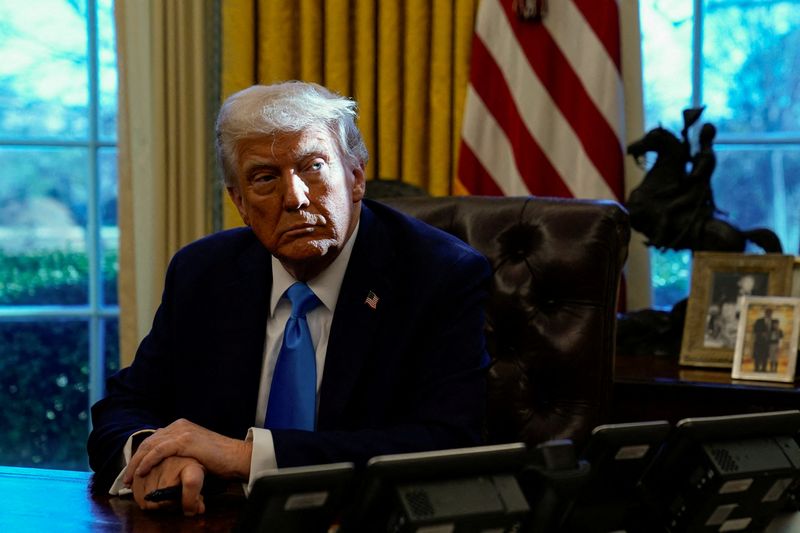
A look at the day ahead in European and global markets from Tom Westbrook
Gold made a foray towards the $3,000-an-ounce mark in the Asia session overnight, touching $2,942, functioning as markets' release valve for the unpredictability of Donald Trump.
Central banks have been big buyers for months, along with investors seeking safety. Worries about U.S. tariffs on gold have also set off a scramble to get the stuff out of London vaults and across the Atlantic.
Stocks broadly steadied on Tuesday as Trump said he was considering exempting Australia from steel tariffs, following a call with Australia's Prime Minister - reinforcing investors' belief that everything's negotiable.
Trump likes that the U.S. runs a trade surplus with Australia and said "the reason is they buy a lot of airplanes. They're rather far away and they need lots of airplanes."
He has vowed to impose reciprocal tariffs on countries over the next two days.
Markets' focus on Tuesday will likely also be on Fed Chair Jerome Powell's testimony on Capitol Hill, where he is sure to be questioned about his thinking on inflation and tariffs.
He is due to appear over two days and on Wednesday his testimony will follow consumer price data for January.
Markets have already scaled back expected rate cuts this year to just 38 basis points.
EV MARKET BATTLE INTENSIFIES
A DeepSeek-esque shakeout unfolded among electric vehicle stocks on Tuesday.
China's BYD (SZ:002594) has started offering advanced autonomous driving features on most of its models, including ones priced as low as $9,555, far undercutting competitors such as Tesla (NASDAQ:TSLA).
And Leapmotor (HK:9863), the Chinese partner of Stellantis (NYSE:STLA), launched on Tuesday a new EV with smart driving technology priced under 150,000 yuan ($20,535).
Tesla shares were down 3% to a two-month low overnight while shares in Chinese automakers Xpeng (NYSE:XPEV) and Geely Auto (HK:0175) tumbled in Hong Kong on Tuesday.
BYD's Hong Kong shares, meanwhile, climbed more than 4% to a record high.
Key developments that could influence markets on Tuesday:
- Earnings: BP (NYSE:BP), Banco BPM
- Speeches: BoE's Mann and Bailey
- Jerome Powell testifies to the Senate Banking, Housing and Urban Affairs Committee

By Nidhi Verma
NEW DELHI (Reuters) -Indian oil companies are looking to buy U.S. liquefied natural gas (LNG), buoyed by the Trump administration's lifting of a ban on export permits for new projects, Oil Secretary Pankaj Jain said on Monday.
The world's fourth largest importer of LNG, India aims to raise the share of gas in its energy mix to 15% by 2030 from 6.2% now.
"Indian oil companies are talking to U.S. companies for additional LNG sourcing," Jain said, adding that among such companies were GAIL (India) (NSE:GAIL) Ltd, Indian Oil Corp and Bharat Petroleum (NSE:BPCL) Corp.
Indian companies will discuss gas sourcing with suppliers of U.S. LNG on the sidelines of the four-day India Energy Week conference from Monday, Jain told reporters.
Indian companies would consider buying stakes in U.S. LNG projects if the deals were attractive, he added.
GAIL will revive plans to buy a stake in a U.S. LNG plant or secure a long-term US LNG deal, its chairman, Sandeep Kumar Gupta, told Reuters.
GAIL now imports 5.8 million tons of U.S. LNG annually under long-term deals, split between Berkshire Hathaway (NYSE:BRKa) Energy's Cove Point plant and Cheniere Energy (NYSE:LNG)'s Sabine Pass site in Louisiana.
The bulk of India's LNG imports under long term deals is supplied by Qatar, with prices linked to crude oil. India's gas sourcing portfolio should have a mix of both U.S. Henry Hub and crude oil linked prices, Jain said.
Indian companies are particularly keen to buy LNG from the U.S. as crude oil could be purchased from multiple suppliers.
Indian Oil Minister Hardeep Singh Puri said energy imports from the United States would be discussed when Prime Minister Narendra Modi meets President Donald Trump this week.
At least six Asian countries, including Japan and Taiwan, have expressed interest in buying U.S. LNG, with some hoping to narrow their trade deficits in the face of Trump tariff threats, while others look to expand and diversify supplies.
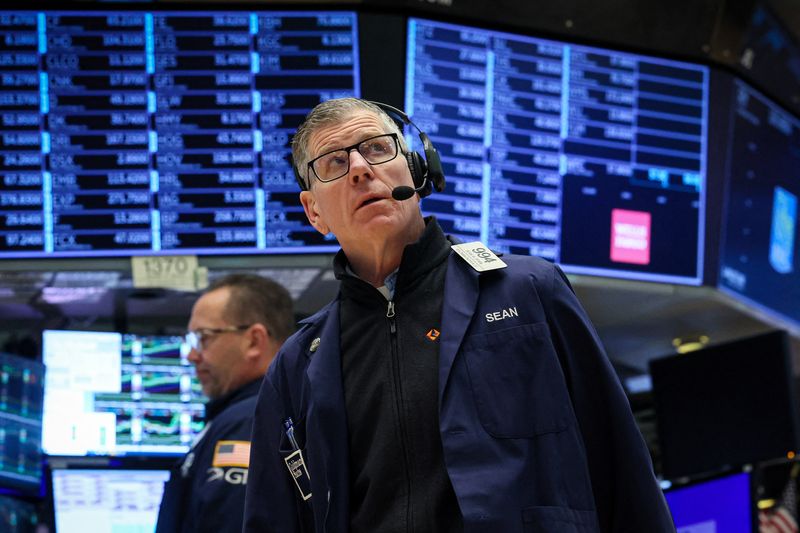
Investing.com-- U.S. stock index futures fell on Monday evening as President Donald Trump signed executive orders imposing tariffs on major metal imports, while caution before key inflation data also weighed.
Futures fell after a positive session on Wall Street, as investors engaged in some dip-buying from last week’s losses. Heavyweight technology stocks were the biggest drivers of gains.
S&P 500 Futures fell 0.2% to 6,075.50 points, while Nasdaq 100 Futures fell 0.3% to 21,789.25 points by 19:21 ET (00:21 GMT). Dow Jones Futures fell 0.2% to 44,504.0 points.
Trump signs orders on steel, aluminum tariffs
Trump on Monday signed executive orders imposing 25% tariffs on steel and aluminum imports, while also stating that there would be no exceptions to the duties.
Major steel exporters such as Canada, Mexico, and Brazil were subject to some quota-based tariff exceptions, which will now be revoked.
Trump warned that tariffs on metals could go higher, and that he was considering tariffs on cars, chips, and pharmaceuticals. The U.S. President also flagged plans to raise U.S. import tariffs to match foreign duties on the import of U.S. goods.
Trump’s renewed tariff talk had rattled Wall Street last week, setting up U.S. stocks for some dip-buying on Monday.
The S&P 500 Futures rose 0.7% to 6,066.48 points, while the NASDAQ Composite rose nearly 1% to 19,714.27 points. The Dow Jones Industrial Average rose 0.4% to 44,470.41 points.
Gains in heavyweight technology stocks, particularly chipmakers, buoyed Wall Street, as a raft of Wall Street’s so-called artificial intelligence hyperscalers signaled that they will increase AI spending in 2025.
Energy stocks surged tracking gains in oil prices, as investors bet that tariff-related disruptions in the oil supply chain will tighten markets.
But overall gains were limited by weakness in cyclical stocks, amid growing uncertainty over the U.S. economic outlook.
CPI inflation data due this week, to offer more rate cues
Focus was now squarely on upcoming consumer price index inflation data, due on Wednesday, for more cues on the world’s largest economy.
The reading is expected to show inflation remained sticky in January, giving the Federal Reserve little impetus to cut interest rates in the near-term.
Several Fed officials have warned in recent weeks that uncertainty over Trump’s policies- which could be inflationary in nature- will keep the central bank from cutting interest rates.
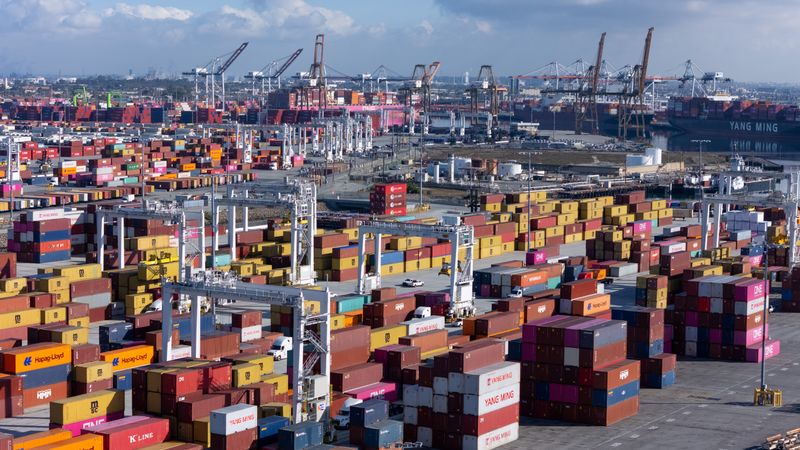
By Lisa Baertlein
(Reuters) - U.S. container imports hit a record high in January, with goods from China notching a year-over-year gain of 10.2%, supply chain technology provider Descartes (NASDAQ:DSGX) said on Monday.
U.S. seaports handled 2.49 million 20-foot equivalent units (TEUs) in January, topping the previous January import record set in 2022. Goods from China accounted for 997,909 TEUs of last month's total.
Some U.S. importers have been rushing in some goods ahead of expected new tariffs and other potential supply-chain disruptions. Goods ranging from plastic toys to parts from machinery have ticked higher in recent months, experts said.
President Donald Trump imposed a new 10% tariff on Chinese goods as of February 4 but paused until March more aggressive 25% tariffs on imports from Mexico and Canada to allow for further negotiations.
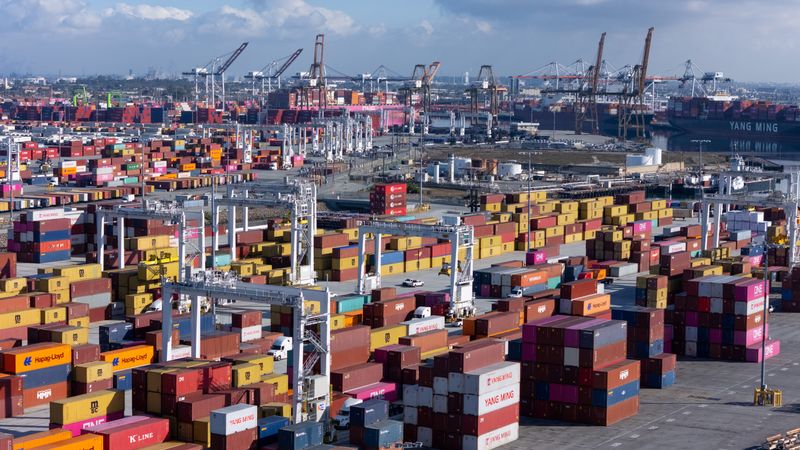
By Lisa Baertlein
(Reuters) - U.S. container imports hit a record high in January, with goods from China notching a year-over-year gain of 10.2%, supply chain technology provider Descartes (NASDAQ:DSGX) said on Monday.
U.S. seaports handled 2.49 million 20-foot equivalent units (TEUs) in January, topping the previous January import record set in 2022. Goods from China accounted for 997,909 TEUs of last month's total.
Some U.S. importers have been rushing in some goods ahead of expected new tariffs and other potential supply-chain disruptions. Goods ranging from plastic toys to parts from machinery have ticked higher in recent months, experts said.
President Donald Trump imposed a new 10% tariff on Chinese goods as of February 4 but paused until March more aggressive 25% tariffs on imports from Mexico and Canada to allow for further negotiations.
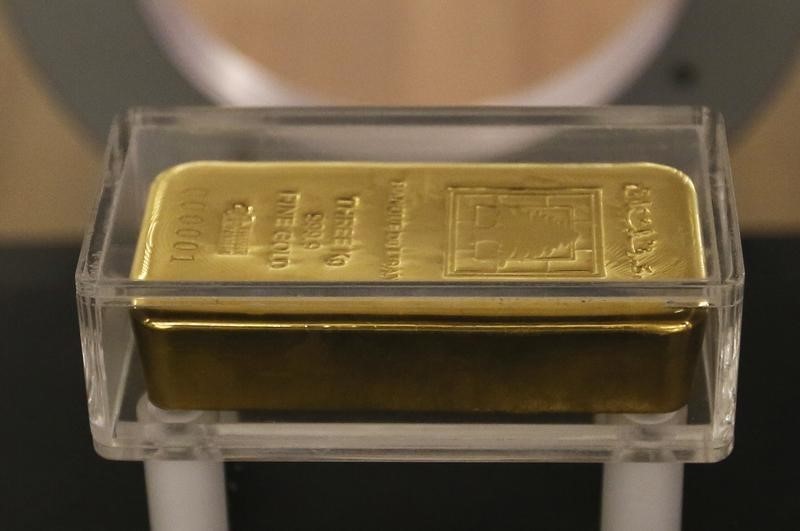
Investing.com-- Gold prices rose to record highs on Monday, buoyed by increased safe haven demand after U.S. President Donald Trump announced more trade tariffs, this time aimed at commodity imports.
Trump also flagged the potential for more tariffs this week, keeping markets largely on edge. Risk-driven assets retreated across Asia, while the dollar firmed.
But strength in the dollar did little to limit gold’s near-term advance.
Spot gold rose 1.1% to a record high $2,892.30 an ounce, while gold futures expiring in April rose 0.9% to $2,916.05 an ounce.
Trump announces 25% tariffs, sends traders running for gold
Trump on Sunday said he will impose 25% trade tariffs on all imports of aluminum and steel to the U.S., sparking jitters over more headwinds to global trade.
Trump also flagged plans for reciprocal tariffs, which will see U.S. import duties increased to match those imposed by the country’s other trading partners.
The announcement came just days after Trump’s 10% tariffs against China took effect. Beijing had retaliated with its own trade measures against the tariffs.
The tariffs ramped up concerns over an escalating trade war between the world’s biggest economies, which could disrupt trade and bode poorly for global growth.
This notion spurred safe haven plays into gold.
Other precious metals were less upbeat. Silver futures were flat at $32.465 an ounce, while platinum futures rose 0.6% to $1,015.10 an ounce.
Among industrial metals, benchmark copper futures on the London Metal Exchange were flat at $9,416.45 a ton, while March copper futures fell slightly to $4.5990 a pound.
Gold gains limited by rate jitters; inflation in focus
While gold was sitting on strong gains and record highs in the past week, bigger gains were somewhat limited by resilience in the dollar, with traders also bracing for high U.S. interest rates in the coming months.
Analysts and Federal Reserve officials have warned that Trump’s tariffs, which will be borne by U.S. importers, could underpin inflation and give the Fed less impetus to cut interest rates.
To this end, U.S. consumer price index inflation data for January is due later this week, and is widely expected to factor into expectations for U.S. interest rates.

